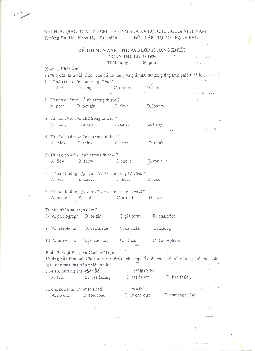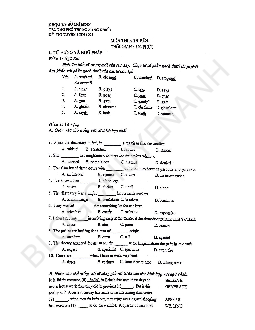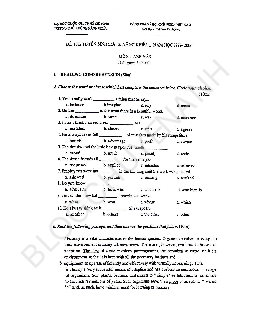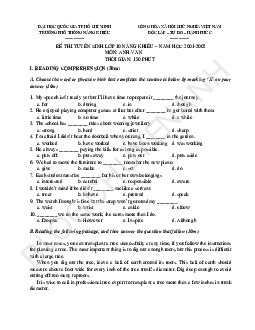







Preview text:
SỞ HẢI DƯƠNG
Mark the letter A, B, C or D on your answer sheet to indicate the correct answer to each of
the following questions. (4.0 points)
Question 1. Catherine was absent from class yesterday __________ she was ill. A. despite B. though C. because of D. because ●
because of + noun = because + clause : bởi vì ●
although clause = despite + noun : mặc dù
Question 2. My sister will __________ a job in Ha Noi as soon as she graduates from university. A. put up B. look after C. put on D. look for ●
put up (phr verb): dựng lên, tăng giá ●
look after (phr verb): chăm sóc ●
put on (phr verb): mặc vào, đội (nón) ●
look for (phr verb): tìm kiếm ● As soon as: ngay sau khi
Question 3. It snowed heavily yesterday. __________, the farmers had to stop working. A. But nhưng B. Therefore do đó C. However tuy nhiên
D. So do đó ( đứng giữa 2 mệnh đề )
Question 4. My little son is very __________ in reading about space exploration. A. interested B. fond C. bored D. keen ●
Be Interested in = be fond of =be keen on : thích, hứng thú điều gì ●
Bored (a): cảm thấy chán nản
Question 5. The old man asked Sally where __________. A.
did she work B. was she working C. she worked D. has she worked ●
Cấu trúc câu tường thuật dạng câu hỏi : S + asked (O) + What/ When/ How/ Who… + S +V (lùi thì)
Question 6. This is __________ film we have ever seen. A. more interesting B. as interesting C. most interesting D. the most interesting ● Cấu trúc So sánh nhất ●
Tính từ ngắn: S + V + the + adj + EST …. ●
Tính từ dài: S + V + the MOST + adj …
Question 7. At the meeting, the chairman suggested __________ funds for the victims of natural disasters. A. raising B. to raise C. raise D. to raising ●
Suggest Ving: đề xuất làm gì ●
Victim /ˈviktəm/(n): Nạn nhân (người, loài vật, đồ vật bị thương, bị giết do sự thiếu cẩn
thận, tội ác, bất hạnh) ●
chairman /ˈtʃermən/ (n): Chủ tịch; người chủ toạ (buổi họp)
Question 8. Cathy __________ me since she moved to Edinburgh 5 years ago. A.
didn’t phone B. isn’t phoning C. hasn’t phoned D. doesn’t phone ●
S+ V (HTHT) since + S + V(QKĐ)
Question 9. It is clear that customs and traditions __________ a great contribution to the unique culture of a country. A. do B. have C. give D. make ●
Make a contribution to smt : đóng góp cho điều gì ●
Custom /ˈkəstəm/ (n): phong tục, tập quán
Question 10. If John doesn’t try his best, he __________ the race. A. was winning B. didn’t win C. won’t win D. wouldn’t win ●
Cấu trúc câu điều kiện loại 1: if + S + V (simple present), S + will/can/shall + V ● Race (n): cuộc đua
Question 11. Giving lucky money to the young nag the old at Tet is a common __________ in Viet Nam. A. attitude B. tradition C. practice D. behavior ●
Attitude /'ætitju:d/ (n): Thái độ, quan điểm ●
tradition /trə´diʃən/ (n): truyền thống ●
practice /´præktis/ (n):Thói quen, thông lệ, lệ thường ●
Behavior /bɪˈheɪvyər/ (n): thái độ, hành vi ● lucky money: tiền lì xì
Question 12. What would you do if you __________ a UFO? A. would see B. have seen C. see D. saw ●
Câu điều kiện loại 2 được sử dụng để diễn tả những tình huống không có thật, không thể
xảy ra trong tương lai và giả định kết quả nếu nó có thể xảy ra. ●
If + S + V-ed, S + would/could/... + V
Question 13. Working with Mr. Lam, a skilled __________ in a pottery village, I have learnt a lot about the art form. A. craftsman B. physicist C. mechanic D. pharmacist ●
Craftsman /ˈkræftsmən/ (n): thợ thủ công ●
physicist /ˈfɪzɪsɪst/(n): nhà vật lí ●
Mechanic /məˈkænɪk/ (n): thợ máy, thợ sưar chữa ●
Pharmacist /ˈfɑːrməsɪst/ (n): dược sĩ ●
pottery village /ˈpɑːt̬ɚri ˈvɪlɪdʒ/: làng gốm
Question 14. Our teacher encouraged us __________ the project soon. A. finishing B. to finish C. finish D. to finishing ●
Encourage sbd to do smt: khuyến khích ai đó làm gì
Question 15. That is the man __________ saved a four-year-old boy from drowning last week. A. where B. who C. when D. which ●
Đại từ quan hệ “who” thay thế cho “the man”.
Question 16. Your sister is singing over there, __________? A. wasn’t she B. doesn’t she C. isn’t she D. didn’t she ●
Cấu trúc câu hỏi đuôi: đông từ chính “is” --> isn’t she
Question 17. Mike needed only one more stamp to complete his __________. A. collectively B. collective C. collection D. collect ●
Collect /kəˈlekt/(v): đến lấy, đi lấy, thu lượm, thu thập, góp nhặt, sưu tầm ● Collection /kəˈlekʃən/ (n): bộ sưu tập ●
Collectively / kəˈlektɪvli/ (adv): tập thể, chung ●
Collective /kəˈlektɪv/ (a): tập thể, chung
Question 18. I wish I __________ speak English fluently. A. could B. will C. am able to D. can ●
Câu ước: S + wish(es) + (that) + S + V-ed/were/p2
Question 19. The road is open now, but it is often blocked by snow __________ winter. A. at B. on C. in D. behind ●
“In” là cụm từ được dùng kèm với các cụm từ chỉ thời gian để nói về một khoảng chung
chung thiên niên kỷ, thập kỷ, trong mùa, trong năm, trong tháng, trong tuần, trong ngày,…
Question 20. The first safety razor __________ by Gillette in 1903. A. have invented B. was invented C. invented D. was inventing ●
Cấu trúc câu bị động: S + be( chia) + V3/ed + by 0 ( S:đối tượng bị tác động bởi hành động) ● Razor /'reizə/ (n): dao cạo
Mark the letter A, B, C or D on your answer sheet to indicate the option that best completes
each of the following exchanges. (1.0 points)
Question 21. Lama and Vera are talking in the garden. Lama: “__________”
Vera: “Usually on foot” A.
How often do you go to work? Bao lâu thì bạn đi làm?
B. How long does it take you to get to work?Bạn mất bao lâu để đến nơi làm việc? B.
How do you go to work every day? Bạn đi làm hàng ngày như thế nào? C.
D. How are you today? Hôm nay bạn thế nào?
Question 22. Jane and Henry are talking at the school gate.
Jane: “What’s the matter with you, Henry?”Có chuyện gì với anh vậy, Henry? Henry: “__________” A.
I have a headache. Tôi bị đau đầu.
B. Oh, nice to meet you. Ồ, rất vui được gặp bạn.
C. You’re welcome. Không có gì
D. The same to you.. bạn cũng vậy.
Question 23. Ben is talking with his friend, Susan.
Ben: “Thank you for your nice gift!” Susan: “__________” A.
Do you know how much does it cost? Bạn có biết nó có giá bao nhiêu không?
B. I’m glad you like it.Tôi rất vui vì bạn thích nó.
C. In fact, I myself dislike it. Trên thực tế, bản thân tôi không thích nó. D.
You can say that again.Bạn có thể nói lại điều đó.
Question 24. Ann and Carol are talking about housework.
Ann: “I think children should be paid for doing the housework.” Tôi nghĩ rằng trẻ em nên
được trả tiền để làm việc nhà
Carol: “__________. It’s their duty in the family.” A.
That’s what I think Đó là những gì tôi nghĩ
B. I don’t think soTôi không nghĩ vậy
C. You’re exactly right . Bạn hoàn toàn đúng
D. There’s no doubt about itKhông có nghi ngờ gì về điều đó
Question 25. Tom and lily are talking in the library.
Tom: I’m taking my final exam tomorrow.” Tôi sẽ làm bài kiểm tra cuối cùng vào ngày mai. Lily: “__________” A.
Good luck t you! Chúc bạn may mắn! B.
B. Oh, poor you! Ôi, tội nghiệp bạn! C.
That’s awful! Cái đó ghê thật D.
D. Congratulation!Chúc mừng!
Read the following passage and mark the letter A, B, C, or D on your answer sheet to
indicate the correct word or phrase that best fits each of the numbered blanks (1.0 points)
Britani will soon ban smoking in cars with children. Britain’s government wants to (26)
__________ the harm that cigarette smoke does to children, New laws will cut the chances of
children passive smoking. This is when someone breathes in the smoke from other people’s
cigarettes. (27) __________ studies say passive smoking can almost be as harmful as actually
smoking a cigarette. The British government says that it has looked at research pointing out
that children (28) __________ sat in smoke-filled cars had health problems. It is particularly
(29) __________ in cars because there is so little space, so the car fills with smoke very
quickly. Not everyone agrees with the new law. Some lawmakers argue that it takes away the
freedom for people to smoke in their own car. (30) __________, Britain’s health minister
states that the health of children is more important than the freedom to smoke. Question 26. A. produce B. destroy C. increase D. reduce Question 27. A. Many B. Much C. Little D. Another Question 28. A. which B. when C. who D. where Question 29. A. funny B. bad C. happy D. boring
Question 30. A. Moreover B. Therefore C. Furthermore D. However ● 26. ●
produce /prəˈduːs/ (v): Làm, sản xuất, chế tạo ●
destroy /dɪˈstrɔɪ/ (v): tàn phá, tiêu diệt ●
Increase /ɪnˈkriːs/ (v): tăng ●
Reduce /rɪˈduːs/ (v): giảm, hạ ● 27. ●
Many+N đếm được số nhiều: nhiều ●
Much + danh từ không đếm được : nhiều ●
Little + danh từ không đếm được: rất ít, không đủ để (có khuynh hướng phủ định) ●
Another + N số ít: cái khác ● 28 ●
Đại từ quan hệ “who” tha ythees cho “the children” ● 29. ●
Funny (a): vui vẻ, khôi hài ● Bad (a): tệ ● Happy (a): vui vẻ ● Boring (a): tẻ nhạt ● 30. ● Moreover: hơn nữa ● Therefore: do đó ● Furthermore: hơn nữa ● However: tuy nhiên
Read the following passage and mark the letter A, B, C, or D on your answer sheet to
indicate the correct answer for each of the question. (1.0 point)
Out in the Pacific Ocean, 3,700 kilometers from Los Angeles, are the islands of Hawaii the
50th state of the United States, with its area of 16,700 square kilometers.
The first Hawaiians arrived from other Pacific islands sometime around 100 AD. Then in
1778, Captain Cook arrived in Hawaii. He put the islands on his maps of the Pacific Ocean.
Then more ships knew Hawaii and began stopping there for supplies. In 1820, a small group
of people from the eastern United States came to teach the Hawaiian people about
Christianity. They started farms to grow sugar cane and pineapples. Because there were not
enough people to do all the farm work, farm owners brought in Asians - Chinese, Japanese, and Filipinos.
Later Koreans, Portuguese, and Puerto Ricans also came. More people came from the US
mainland and from other Pacific islands, and Hawaii became an island with traditions from
several countries. People from the various nation groups have married each other, so today
the groups are partly mixed. Hawaiians are very friendly and always welcome visitors. They
celebrate traditional Chinese, Japanese, and Filipino holidays as well as holidays from The
United States. Hawaii is known as the Aloha State. “Aloha” mean “hello”, “goodbye”, and “I love you” in Hawaiian.
Question 31. The word “They” in paragraph 3 refers to __________. A. foreign visitors B. Hawaiians C. traditions D. Pacific islands
Question 32. According to paragraph 2, in the 19th century, many Asians were taken to Hawaii __________. A. to go fishing B. to work in the factories C. to do the farm work ●
Key: In 1820, a small group of people from the eastern United States came to teach the
Hawaiian people about Christianity. They started farms to grow sugar cane and
pineapples. Because there were not enough people to do all the farm work, farm owners
brought in Asians - Chinese, Japanese, and Filipinos. Later Koreans, Portuguese, and Puerto Ricans also came
D. to teach the Hawaiians people about Christianity.
Question 33. The word “various” in paragraph 3 refers to __________. A. different B. special C. similar D. official ●
Various = different (a): Khác nhau, không giống nhau, thuộc về nhiều loại ●
special /ˈspeʃəl/ (a): đặc biệt ●
similar /ˈsɪməlɚr/ (a): tương tự ●
Official /əˈfɪʃəl/ (a): chính thức
Question 34. According to the passage, which of the following statements is NOT true?
A. Captain Cook came to Hawaii in the 18th century.
B. All Hawaiian people have come from Asia.
C. Hawaii is the place with traditions from several countries.
D. Hawaii is the fiftieth state of the United States. ●
Key: Later Koreans, Portuguese, and Puerto Ricans also came. More people came from
the US mainland and from other Pacific islands, and Hawaii became an island with
traditions from several countries.
Question 35. What is the main topic of the passage?
A.The islands of Hawaii Các đảo Hawaii
B. The area of the islands of HawaiiDiện tích các đảo Hawaii
C.Hawaiians’ friendliness Sự thân thiện của người Hawaii
D. The life of Captain CookCuộc đời của Thuyền trưởng Cook
Mark the letter A, B, C or D on your answer sheet to indicate the underlined part that
needs correction in each of the following questions. (1.0 point)
Question 36. When Mary was a little girl, she used to living with her grandparent in the countryside. A B C D ● Living --> live ● Used to V: dã từng làm gì
Question 37. The problem of urbanization, which is not new to developing countries, is not easily to solve. A B C D ● Easily --> easy ●
Easy to do smt: dễ để làm gì
Question 38. We like Veronica because she is industrial, friendly and helpful to everyone. A B C D ●
Industrial --> industrious (a): cần cù, siêng năng
Question 39. Although the kitchen is small, but it is beautifully designed. A B C D ●
Although clause, clause: mặc dù...
Question 40. In 1964, an American farmer says that he saw an egg-shaped object in one of his fields. A B C D ● Says --> said
Mark the letter A, B, C or D on your answer sheet to indicate the sentence that is closest in
meaning to each of the following questions (1.0 point)
Question 41. There is no organization for social activities for teenagers in my town. It is a pity.
A. I wish there were an organization for social activities for teenagers in my town.
B. I wish there are an organization for social activities for teenagers in my town.
C. I wish there were not an organization for social activities for teenagers in my town.
D I wish there is an organization for social activities for teenagers in my town. ●
Câu ước: S + wish(es) + (that) + S + V-ed/were/p2
Question 42. “You should study harder, Jack.” Said the teacher.
A. The teacher advised Jack to study harder.
B. The teacher prevented Jack from studying harder.
C. The teacher warned Jack against studying harder.
D. The teacher expected Jack study harder. ●
cấu trúc câu tường thuật: S + advised/warned /... + O + to do smt ● Advise (v): khuyên ●
Prevented (v): ngăn chặn, ngăn cản ● Warn (v): cảnh báo ●
Expect (v): mong đợi, mong chờ
Question 43. People know smoking and drinking can shorten our lives dramatically.
A. Smoking and drinking are known to have been able to shortening our lives dramatically.
B. Smoking and drinking are known to be able to shortening our lives dramatically.
C. It is known that smoking and drinking can shorten our lives dramatically.
D. It was known that smoking and drinking can shorten our lives dramatically.
It ís known that + clause: người ta thường nghĩ rằng ●
shorten (v): Thu ngắn lại, làm cho ngắn hơn, rút ngắn
Question 44. The question is too difficult for me to answer.
A. The question is easy enough for me to answer.
B. The question is very difficult that I cannot answer it.
C. The question is such difficult that I cannot answer it.
D. The question is so difficult that I cannot answer it. ●
S + tobe + too + adj +(for sbd) + to + V = S + be+ so + adj + that + S + V:quá... đến nỗi mà
Question 45. Caroline doesn’t take many photos because she doesn’t have time.
A. Caroline will have time if she takes many photos.
B. If Caroline took many photos, she would have time.
C. If Caroline has time, she will take many photos.
D. Caroline would take many photos if she had time. ●
Câu điều kiện loại 2 được sử dụng để diễn tả những tình huống không có thật, không thể
xảy ra trong tương lai và giả định kết quả nếu nó có thể xảy ra. ●
If + S + V-ed, S + would/could/... + V
Mark the letter A, B, C or D on your answer sheet to indicate the sentence that can be
made from the give cues. (1.0 point)
Question 46. Despite/ man/ be/ qualified/ for/ job/ he/ not/ be/ accept.
A. Despite the fact that the man was qualified for the job, he was not accepting.
B. Despite the man was qualified for the job, he was not accepting.
C. Despite the fact that the man was qualified for the job, he was not accepted.
D. Despite the man was qualified for the job, he was not accepted. ●
Despite the fact that + clause: mặc dù ●
Be qualified for smt: đủ khả năng/ tiêu chuẩn cho cái gì
Question 47. Paul/ never/ read/ interesting/ book/ than/ this.
A. Paul has never read an interesting book than this.
B. Paul has never read a more interesting book than this.
C. Paul has never reading a more interesting book than this.
D. Paul has never read a so interesting book than this. ● Công thức so sánh hơn: ●
Nếu từ chỉ có 1 âm tiết: ADJ/ADV + đuôi -er + than ●
Nếu từ có 2 âm tiết trở lên: more + ADJ/ADV + than
Question 48. Mrs. Thatcher/ not/ mind/ work/ 10 hours/ day/ as long as/ she/ earn/ enough/ family.
A. Mrs. Thatcher does not mind working 10 hours a day as long as she earns enough for her family.
B. Mrs. Thatcher does not mind to work 10 hours a day as long as she earns enough for her family.
C. Mrs. Thatcher does not mind working 10 hours a day as long as she earn enough for her family.
D. Mrs. Thatcher not mind working 10 hours a day as long as she earns enough for her family. ●
Mind doing smt: phiền làm gì ● As long as: miễn là
Question 49. The woman/ live/ next door/ donate/ thousands of dollars/ local charities/ every year.
A. The woman who lives next door donates thousands of dollars to local charities every year.
B. The woman lives next door donates thousands of dollars to local charities every year.
C. The woman who lives next door donating thousands of dollars to local charities every year.
D. The woman which lives next door donates thousands of dollars to local charities every year. ●
Sử dụng mệnh đề quan hệ: đại từ quan hệ “who” thay thế cho “the woman”
Question 50. Nowadays/ students/ tend/ be/ more/ responsible/ studies.
A. Nowadays, students tended to be more responsible for our studies.
B. Nowadays, students tend to be more responsible for their studies.
C. Nowadays, students tending to be more responsible for their studies.
D. Nowadays, students tends to being more responsible for their studies ●
Tend to do smt: có xu hướng làm gì ●
Be responsible for smt: có trách nhiệm cho cái gì ------ THE END ------




